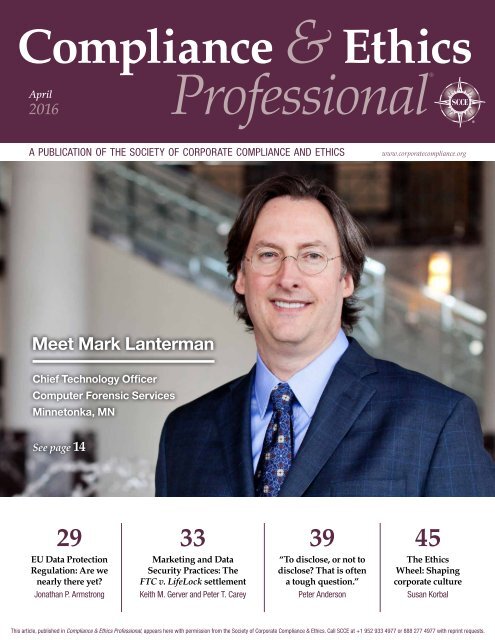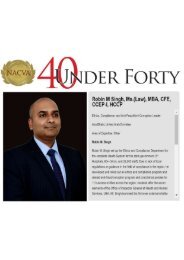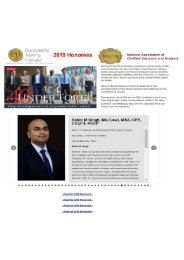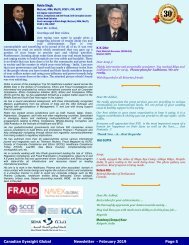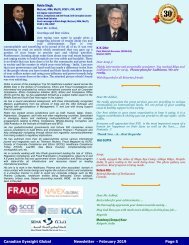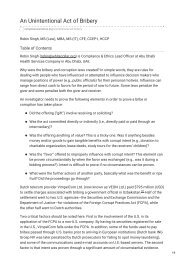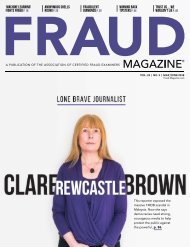Key elements of an anti-bribery_anti-corruption framework
Key Takeaways (Article by Robin Singh) » To successfully develop and implement an anti-corruption framework, an organization must have an excellent tone at the top. » An anti-corruption framework must have a robust, clear, and comprehensive de nition section for any employee or vendor to refer to. » Assess your organization’s culture with adequate risk assessments and take steps to mitigate problem areas. » The degree of con dentiality and mechanism of reporting offered to employees will inform the level of trust those employees maintain. » Investigation procedures and disciplinary actions that an employee might face are indicators of an organization’s tolerance and intolerance toward misconduct. By #RobinSingh the #whitecollarinvestigator
Key Takeaways (Article by Robin Singh) » To successfully develop and implement an anti-corruption framework, an organization must have an excellent tone at the top. » An anti-corruption framework must have a robust, clear, and comprehensive de nition section for any employee or vendor to refer to. » Assess your organization’s culture with adequate risk assessments and take steps to mitigate problem areas. » The degree of con dentiality and mechanism of reporting offered to employees will inform the level of trust those employees maintain. » Investigation procedures and disciplinary actions that an employee might face are indicators of an organization’s tolerance and intolerance toward misconduct. By #RobinSingh the #whitecollarinvestigator
You also want an ePaper? Increase the reach of your titles
YUMPU automatically turns print PDFs into web optimized ePapers that Google loves.
Compli<strong>an</strong>ce & Ethics<br />
April<br />
2016<br />
Pr<strong>of</strong>essional®<br />
a publication <strong>of</strong> the society <strong>of</strong> corporate compli<strong>an</strong>ce <strong>an</strong>d ethics<br />
www.corporatecompli<strong>an</strong>ce.org<br />
Meet Mark L<strong>an</strong>term<strong>an</strong><br />
Chief Technology Officer<br />
Computer Forensic Services<br />
Minnetonka, MN<br />
See page 14<br />
29<br />
EU Data Protection<br />
Regulation: Are we<br />
nearly there yet?<br />
Jonath<strong>an</strong> P. Armstrong<br />
33<br />
Marketing <strong>an</strong>d Data<br />
Security Practices: The<br />
FTC v. LifeLock settlement<br />
Keith M. Gerver <strong>an</strong>d Peter T. Carey<br />
39<br />
“To disclose, or not to<br />
disclose? That is <strong>of</strong>ten<br />
a tough question.”<br />
Peter Anderson<br />
45<br />
The Ethics<br />
Wheel: Shaping<br />
corporate culture<br />
Sus<strong>an</strong> Korbal<br />
This article, published in Compli<strong>an</strong>ce & Ethics Pr<strong>of</strong>essional, appears here with permission from the Society <strong>of</strong> Corporate Compli<strong>an</strong>ce & Ethics. Call SCCE at +1 952 933 4977 or 888 277 4977 with reprint requests.
y Robin Singh, MSc-Law, MBA, CFE<br />
<strong>Key</strong> <strong>elements</strong> <strong>of</strong> <strong>an</strong><br />
<strong>an</strong>ti-<strong>bribery</strong>/<strong>an</strong>ti-<strong>corruption</strong><br />
<strong>framework</strong><br />
»»<br />
To successfully develop <strong>an</strong>d implement <strong>an</strong> <strong>an</strong>ti-<strong>corruption</strong> <strong>framework</strong>, <strong>an</strong> org<strong>an</strong>ization must have <strong>an</strong> excellent tone at<br />
the top.<br />
»»<br />
An <strong>an</strong>ti-<strong>corruption</strong> <strong>framework</strong> must have a robust, clear, <strong>an</strong>d comprehensive definition section for <strong>an</strong>y employee or<br />
vendor to refer to.<br />
»»<br />
Assess your org<strong>an</strong>ization’s culture with adequate risk assessments <strong>an</strong>d take steps to mitigate problem areas.<br />
»»<br />
The degree <strong>of</strong> confidentiality <strong>an</strong>d mech<strong>an</strong>ism <strong>of</strong> reporting <strong>of</strong>fered to employees will inform the level <strong>of</strong> trust those<br />
employees maintain.<br />
»»<br />
Investigation procedures <strong>an</strong>d disciplinary actions that <strong>an</strong> employee might face are indicators <strong>of</strong> <strong>an</strong> org<strong>an</strong>ization’s<br />
toler<strong>an</strong>ce <strong>an</strong>d intoler<strong>an</strong>ce toward misconduct.<br />
Singh<br />
Anti-<strong>bribery</strong> statutes are enforced<br />
in m<strong>an</strong>y nations across the world.<br />
One <strong>of</strong> the most prominent<br />
statutes is enforced in the United Kingdom<br />
through the Bribery Act <strong>of</strong> 2010 <strong>an</strong>d various<br />
nineteenth century <strong>an</strong>d twentieth century<br />
laws. The United States <strong>of</strong> America<br />
has enforced the Foreign Corrupt<br />
Practices Act <strong>of</strong> 1977 (FCPA). Some<br />
other countries with strong <strong>an</strong>ti<strong>corruption</strong><br />
<strong>framework</strong>s in place are<br />
Russia, Italy, Irel<strong>an</strong>d, China, <strong>an</strong>d<br />
Brazil. Although the Netherl<strong>an</strong>ds<br />
has not laid down a specific statute<br />
against <strong>an</strong>ti-<strong>corruption</strong>, its Dutch<br />
Criminal Code (DCC) constitutes <strong>bribery</strong><br />
by a civil serv<strong>an</strong>t as a criminal <strong>of</strong>fense<br />
(Article 177, 177a, <strong>an</strong>d 178 <strong>of</strong> Dutch Criminal<br />
Code). These articles were specifically<br />
introduced into the Dutch Criminal Code<br />
as a compli<strong>an</strong>ce measure <strong>of</strong> the OECD<br />
convention <strong>of</strong> 1997.<br />
Top Nine <strong>elements</strong> <strong>of</strong> <strong>an</strong>ti-<strong>bribery</strong> <strong>framework</strong><br />
The Bribery Act <strong>of</strong> 2010 in the United<br />
Kingdom came into force on July 1, 2011. The<br />
Act is a representation that strengthens the<br />
position <strong>of</strong> the United Kingdom on <strong>corruption</strong><br />
<strong>an</strong>d <strong>bribery</strong> <strong>an</strong>d is a major milestone in the<br />
development <strong>of</strong> <strong>an</strong>ti-<strong>bribery</strong> legislations at a<br />
global level.<br />
Here are the Top Nine <strong>elements</strong> <strong>of</strong><br />
<strong>an</strong>ti-<strong>bribery</strong> <strong>framework</strong>, according to the<br />
UK Bribery Act.<br />
1. Procedures should be proportionate:<br />
Procedures that exist to prevent <strong>an</strong>y act<br />
<strong>of</strong> <strong>bribery</strong> should be proportionate to<br />
the risk. Moreover, policies should be<br />
accessible, clear, practical, enforced, <strong>an</strong>d<br />
effectively implemented.<br />
Compli<strong>an</strong>ce & Ethics Pr<strong>of</strong>essional ® April 2016<br />
+1 952 933 4977 or 888 277 4977 www.corporatecompli<strong>an</strong>ce.org 73
Compli<strong>an</strong>ce & Ethics Pr<strong>of</strong>essional ® April 2016<br />
2. Commitment <strong>of</strong> top m<strong>an</strong>agement: Top<br />
m<strong>an</strong>agement should be thoroughly<br />
committed to confrontation <strong>of</strong> <strong>bribery</strong><br />
across the comp<strong>an</strong>y. M<strong>an</strong>agement<br />
should work towards creating a culture<br />
where accepting or giving bribes must<br />
be discouraged.<br />
3. Risk assessment: While assessing risks,<br />
both internal <strong>an</strong>d external risks should<br />
be considered. Regular risk assessments<br />
should be performed <strong>an</strong>d the results<br />
should be documented.<br />
4. Due diligence: The <strong>an</strong>ti-<strong>bribery</strong> approach<br />
has to be risk-based <strong>an</strong>d proportionate.<br />
Persistent efforts should be given by all<br />
parties who are providing services for<br />
the business.<br />
5. Communication <strong>an</strong>d training:<br />
Procedures as well as policies should be<br />
understood <strong>an</strong>d embedded. Training that<br />
is conducted should be in proportion<br />
to risks <strong>an</strong>d customized according to<br />
specific needs. Unless you train, the<br />
<strong>framework</strong>/policy is ineffective <strong>an</strong>d you<br />
c<strong>an</strong> forget about getting compli<strong>an</strong>ce. Train<br />
<strong>an</strong>d carry out refresher trainings to make<br />
it a success.<br />
6. Internal audits: Internal audits should<br />
be conducted according to documented<br />
procedure to check the effectiveness <strong>of</strong><br />
<strong>an</strong>ti-<strong>bribery</strong> procedures.<br />
7. Monitoring <strong>an</strong>d review: Evaluation is<br />
essential to find out how effective the<br />
procedures for <strong>bribery</strong> prevention are<br />
in <strong>an</strong> org<strong>an</strong>ization <strong>an</strong>d make ch<strong>an</strong>ges<br />
wherever necessary.<br />
8. Reporting: It is a question that is<br />
defined differently <strong>an</strong>d <strong>of</strong>fers a different<br />
level <strong>of</strong> confidentiality depending on<br />
the institution that is developing the<br />
<strong>an</strong>ti-<strong>corruption</strong> <strong>framework</strong>, such as<br />
non-governmental or governmental<br />
institutions c<strong>an</strong> <strong>of</strong>fer. Depending on<br />
the type <strong>of</strong> reporting <strong>an</strong>d the degree<br />
<strong>of</strong> confidentiality, <strong>an</strong> org<strong>an</strong>ization c<strong>an</strong><br />
proactively propose their assist<strong>an</strong>ce<br />
as intermediaries in addressing<br />
such <strong>of</strong>fences.<br />
9. Investigation & Discipline: The<br />
<strong>framework</strong> should define <strong>an</strong> org<strong>an</strong>ization’s<br />
zero toler<strong>an</strong>ce towards such crimes<br />
<strong>an</strong>d the level <strong>of</strong> discipline to which <strong>an</strong><br />
org<strong>an</strong>ization is willing to go to set a lesson<br />
<strong>an</strong>d ingrain a culture <strong>of</strong> integrity.<br />
Comparison between Chinese <strong>an</strong>ti-<strong>corruption</strong><br />
laws <strong>an</strong>d FCPA<br />
M<strong>an</strong>y people are under the impression that<br />
all nations where they carry out business<br />
tr<strong>an</strong>sactions have <strong>an</strong>ti-<strong>corruption</strong> laws similar<br />
to those in their home countries. However,<br />
such assumptions <strong>of</strong>ten lead to negative<br />
consequences, especially if you are not<br />
familiar with the legal system <strong>an</strong>d cultural<br />
practices <strong>of</strong> a country where you are currently<br />
conducting your business. For example, if your<br />
comp<strong>an</strong>y has business interests in the People’s<br />
Republic <strong>of</strong> China (PRC), you may have to<br />
revisit your compli<strong>an</strong>ce program to make sure<br />
that you are complying with China’s severe<br />
<strong>an</strong>d singular <strong>an</strong>ti-<strong>corruption</strong> regulations. We<br />
will now illustrate how the USA’s FCPA is<br />
different from China’s <strong>an</strong>ti-<strong>corruption</strong> laws.<br />
One law versus a set <strong>of</strong> laws<br />
FCPA provides the central set <strong>of</strong> guidelines<br />
that are applicable for Americ<strong>an</strong> comp<strong>an</strong>ies<br />
that do business overseas <strong>an</strong>d with<br />
international org<strong>an</strong>izations that have their<br />
presence in the U.S. The FCPA is a single<br />
United States federal law, <strong>an</strong>d its rules<br />
for conducting international business<br />
have simplified the processes that help in<br />
ensuring compli<strong>an</strong>ce. In contrast, China’s<br />
<strong>an</strong>ti-<strong>corruption</strong> rules do not exist as a single<br />
law. They are spread across various rules<br />
<strong>an</strong>d regulations that include the Anti-Unfair<br />
Competition Law, 1 Provisional Measures<br />
74 www.corporatecompli<strong>an</strong>ce.org +1 952 933 4977 or 888 277 4977
on the Prohibition <strong>of</strong> Commercial Bribery,<br />
PRC Criminal Law, <strong>an</strong>d m<strong>an</strong>y other judicial<br />
decisions <strong>an</strong>d laws. Because each law’s scope<br />
is to cover a certain aspect <strong>of</strong> <strong>corruption</strong>, a<br />
specific compli<strong>an</strong>ce program needs to be<br />
created especially for China that must cover<br />
all the different laws that constitute the <strong>an</strong>ti<strong>corruption</strong><br />
rules <strong>of</strong> China.<br />
Differences in<br />
definitions<br />
Anti-<strong>corruption</strong><br />
rules in the United<br />
States are more<br />
clearly defined th<strong>an</strong><br />
in China as far as<br />
the prohibition <strong>of</strong><br />
actions is concerned.<br />
For inst<strong>an</strong>ce, it is<br />
stated by the FCPA<br />
that giving gifts <strong>of</strong><br />
value or payments to<br />
foreign <strong>of</strong>ficials, so<br />
that their positions<br />
c<strong>an</strong> be used to secure a commercial contract<br />
or bypass custom regulations, is prohibited.<br />
On the other h<strong>an</strong>d, <strong>an</strong>ti-<strong>corruption</strong> laws<br />
in China are not defined specifically. The<br />
definition given is quite broad, because the<br />
exch<strong>an</strong>ge <strong>of</strong> gifts is very common in China,<br />
<strong>an</strong>d a distinction between a gift <strong>an</strong>d a<br />
bribe with no expectations is quite tough to<br />
make out.<br />
Comparison between FCPA <strong>an</strong>d<br />
UK Bribery Act<br />
Active <strong>an</strong>d passive <strong>bribery</strong><br />
The UK Bribery Act prohibits active as well<br />
as passive <strong>bribery</strong>, but the FCPA prohibits<br />
only active <strong>bribery</strong>.<br />
Bribery on a private level<br />
The UK Bribery Act covers <strong>bribery</strong> even on<br />
a private level, unlike the FCPA, although<br />
To bribe a foreign <strong>of</strong>ficial<br />
is considered <strong>an</strong> <strong>of</strong>fense<br />
by both the FCPA <strong>an</strong>d<br />
the UK Bribery Act.<br />
However, the FCPA<br />
defines a foreign <strong>of</strong>ficial<br />
in a broader m<strong>an</strong>ner<br />
th<strong>an</strong> the UK Bribery Act.<br />
such conduct may be prohibited by other<br />
legislation in the U.S.<br />
Bribery <strong>of</strong> foreign <strong>of</strong>ficials<br />
To bribe a foreign <strong>of</strong>ficial is considered <strong>an</strong><br />
<strong>of</strong>fense by both the FCPA <strong>an</strong>d the UK Bribery<br />
Act. However, the FCPA defines a foreign<br />
<strong>of</strong>ficial in a broader m<strong>an</strong>ner th<strong>an</strong> the UK<br />
Bribery Act.<br />
Intent<br />
Under the FCPA,<br />
one has to prove<br />
that a person who<br />
is trying to bribe<br />
someone else is<br />
doing so with a<br />
“corrupt” intent.<br />
This is not the case<br />
in the UK Bribery<br />
Act, where there<br />
is no requirement<br />
to prove <strong>an</strong><br />
improper intent.<br />
What are the three top tests that a<br />
compli<strong>an</strong>ce <strong>of</strong>ficer or <strong>an</strong> internal auditor<br />
should follow?<br />
The main reason to conduct subst<strong>an</strong>tive<br />
testing is to detect red flag or potential<br />
<strong>corruption</strong> violations. An internal audit<br />
should not be treated as <strong>an</strong> investigation, but<br />
as a process like <strong>an</strong>y other process. If <strong>an</strong>y red<br />
flag or serious potential violation is detected,<br />
protocol must be immediately put into place<br />
for consultation. The following are some tests<br />
that a compli<strong>an</strong>ce <strong>of</strong>ficer must follow for <strong>an</strong><br />
<strong>an</strong>ti-<strong>corruption</strong> audit:<br />
1. Risk assessment: The Audit/Compli<strong>an</strong>ce<br />
Review should be based on <strong>an</strong><br />
org<strong>an</strong>ization’s risk assessment/fraud risk<br />
assessment to concentrate on areas that face<br />
elevated level <strong>of</strong> risks for <strong>bribery</strong>/<strong>corruption</strong>.<br />
A compli<strong>an</strong>ce <strong>of</strong>ficer must test how effective<br />
Compli<strong>an</strong>ce & Ethics Pr<strong>of</strong>essional ® April 2016<br />
+1 952 933 4977 or 888 277 4977 www.corporatecompli<strong>an</strong>ce.org 75
Compli<strong>an</strong>ce & Ethics Pr<strong>of</strong>essional ® April 2016<br />
the comp<strong>an</strong>y’s existing controls are, in<br />
comparison to the need derived by the<br />
business. Furthermore, the controls c<strong>an</strong><br />
be tested in relation to <strong>an</strong>y international<br />
leading practice which would befit the<br />
org<strong>an</strong>ization.<br />
2. Pre-site procedures <strong>an</strong>d pl<strong>an</strong>ning: Pre-site<br />
pl<strong>an</strong>ning procedures may include a<br />
notification letter to the business units to be<br />
audited; teleconferencing with m<strong>an</strong>agement<br />
to explain the aim <strong>of</strong> the audit process<br />
<strong>an</strong>d talk about potential <strong>corruption</strong> risks;<br />
<strong>an</strong>d requests for relev<strong>an</strong>t information,<br />
especially fin<strong>an</strong>cial data so that the process<br />
<strong>of</strong> choosing samples for testing tr<strong>an</strong>sactions<br />
c<strong>an</strong> be started.<br />
3. Fieldwork: In <strong>an</strong> <strong>an</strong>ti-<strong>corruption</strong> audit,<br />
fieldwork is conducted for one to two weeks<br />
<strong>an</strong>d includes onsite procedures at a business<br />
unit. The focus <strong>of</strong> the fieldwork is to do a<br />
compli<strong>an</strong>ce test for the different <strong>elements</strong> <strong>of</strong><br />
<strong>an</strong> <strong>an</strong>ti-<strong>corruption</strong> compli<strong>an</strong>ce program <strong>an</strong>d<br />
to conduct subst<strong>an</strong>tive testing to detect red<br />
flags or potential violations.<br />
Top clauses to include in vendor contracts<br />
To ensure compli<strong>an</strong>ce with the FCPA <strong>an</strong>d UK<br />
Bribery Act, it is import<strong>an</strong>t to identify high-risk<br />
affiliates, subsidiaries, <strong>an</strong>d personnel, including<br />
consult<strong>an</strong>ts, agents, contractors, <strong>an</strong>d employees<br />
in a comp<strong>an</strong>y. It should be understood that a<br />
comp<strong>an</strong>y is responsible for FCPA violations<br />
that are committed by these stakeholders. Here<br />
are some clauses that should be included in a<br />
contract with your contractors or vendors to<br />
avoid violation <strong>of</strong> FCPA:<br />
··<br />
A st<strong>an</strong>dard contract may include warr<strong>an</strong>ties<br />
<strong>an</strong>d representations;<br />
··<br />
A clause should mention your discretion<br />
to terminate that contract if your partner is<br />
found to violate the FCPA or the UK Bribery<br />
Act; <strong>an</strong>d<br />
··<br />
An indemnification clause c<strong>an</strong> be also<br />
included if a contractor or a vendor is<br />
found to be a party in violation <strong>of</strong> the <strong>an</strong>ti<strong>corruption</strong>/<strong>an</strong>ti-<strong>bribery</strong><br />
act.<br />
Impact <strong>of</strong> data <strong>an</strong>alytics for proactive<br />
<strong>an</strong>ti-<strong>bribery</strong> review<br />
The regulatory environment has become quite<br />
stringent in today’s business world, <strong>an</strong>d all those<br />
US firms that have global business interests are<br />
under tremendous pressure to ensure that their<br />
compli<strong>an</strong>ce programs on <strong>an</strong>ti-<strong>corruption</strong> <strong>an</strong>d<br />
<strong>an</strong>ti-<strong>bribery</strong> are improved. Potentially improper<br />
payments that would expose the org<strong>an</strong>ization<br />
to risks under the FCPA should be detected<br />
<strong>an</strong>d prevented. At m<strong>an</strong>y <strong>of</strong> the multinational<br />
comp<strong>an</strong>ies, senior m<strong>an</strong>agement, boards, <strong>an</strong>d<br />
compli<strong>an</strong>ce audit committees are focused<br />
towards <strong>an</strong>ti-<strong>corruption</strong> compli<strong>an</strong>ce.<br />
Anti-<strong>corruption</strong> <strong>an</strong>d <strong>an</strong>ti-<strong>bribery</strong> <strong>an</strong>alytics<br />
tests <strong>of</strong> controls incorporate concepts <strong>of</strong> big data<br />
that c<strong>an</strong> integrate data from multiple sources<br />
(e.g., text mining, tr<strong>an</strong>sactional data, <strong>an</strong>d email<br />
<strong>an</strong>d social media) to isolate as well as prioritize<br />
rogue activity <strong>an</strong>d areas <strong>of</strong> risk. These <strong>an</strong>ti<strong>corruption</strong><br />
<strong>an</strong>alytics c<strong>an</strong> be used by executives<br />
in reducing costs pertaining to compli<strong>an</strong>ce<br />
fieldwork or internal audits. These <strong>an</strong>alytics are<br />
included in the risk assessment process to find<br />
out which comp<strong>an</strong>y locations should be audited,<br />
rather th<strong>an</strong> simply running the <strong>an</strong>alytics.<br />
Impact <strong>of</strong> <strong>an</strong>ti-<strong>bribery</strong> <strong>framework</strong> on policies<br />
The UK Bribery Act provides various<br />
restrictions on the conduct <strong>of</strong> employees<br />
in various situations while they deal with<br />
stakeholders <strong>an</strong>d government clients as part <strong>of</strong><br />
the <strong>an</strong>ti-<strong>bribery</strong> provisions. A clear St<strong>an</strong>dard<br />
<strong>of</strong> Conduct (also called a Code <strong>of</strong> Ethics),<br />
conflict <strong>of</strong> interest policy, <strong>an</strong>d other <strong>an</strong>ti-fraud<br />
policies are required. If the employees are not<br />
made aware <strong>of</strong> the various restrictions <strong>an</strong>d<br />
provisions <strong>of</strong> the Act, they may violate them<br />
out <strong>of</strong> sheer ignor<strong>an</strong>ce. Thus, extensive training<br />
on the complete scope <strong>of</strong> violations, along with<br />
appropriate scenarios <strong>an</strong>d examples, must be<br />
76 www.corporatecompli<strong>an</strong>ce.org +1 952 933 4977 or 888 277 4977
given to staff that is in sync with their work<br />
pr<strong>of</strong>iles. It is rightfully stated that creating<br />
awareness is the first major step to complying<br />
with this <strong>an</strong>ti-<strong>corruption</strong> law.<br />
Where does the legal element fit in <strong>an</strong><br />
<strong>an</strong>ti-<strong>bribery</strong> <strong>framework</strong>?<br />
The Compli<strong>an</strong>ce department works closely<br />
with Legal Affairs to interpret/underst<strong>an</strong>d the<br />
legal <strong>an</strong>gle when carrying out <strong>an</strong> investigation.<br />
Section 7 <strong>of</strong> the UK Bribery Act declares a<br />
criminal <strong>of</strong>fense in all those circumst<strong>an</strong>ces<br />
where persons associated with a relev<strong>an</strong>t<br />
commercial org<strong>an</strong>ization have committed <strong>an</strong> act<br />
<strong>of</strong> <strong>bribery</strong> in order to procure business for the<br />
said org<strong>an</strong>ization. The guid<strong>an</strong>ce provided by the<br />
Act <strong>an</strong>d its implication must be understood well<br />
in adv<strong>an</strong>ce, such as underst<strong>an</strong>ding the me<strong>an</strong>ing<br />
<strong>of</strong> relev<strong>an</strong>t commercial org<strong>an</strong>ization, business,<br />
<strong>bribery</strong>, <strong>an</strong>d associated person in relation<br />
the evidence identified in the investigation.<br />
Similarly, on the FCPA front, the legislative<br />
history speaks <strong>of</strong> keywords such as willful<br />
blindness, deliberate ignor<strong>an</strong>ce, <strong>an</strong>d taking a<br />
head-in-the-s<strong>an</strong>d, which needs to be interpreted<br />
in correlation with the evidence obtained. At<br />
the end, a decision for prosecution should be<br />
done on the merits <strong>of</strong> how strong the available<br />
evidences are <strong>an</strong>d whether it is really in the<br />
interests <strong>of</strong> the public/org<strong>an</strong>ization/stakeholder<br />
to prosecute. ✵<br />
1. The Supreme People’s Court <strong>of</strong> the People’s Republic <strong>of</strong> China: Anti<br />
Unfair Competition Law. Posted September 9, 2003. Available at<br />
http://bit.ly/china-court<br />
Robin Singh (robinsingh002@yahoo.com) is Corporate Senior<br />
Compli<strong>an</strong>ce <strong>an</strong>d Fraud Examiner at Abu Dhabi Health Services<br />
Comp<strong>an</strong>y in Abu Dhabi, United Arab Emirates. @drobinsingh<br />
ae.linkedin.com/in/whitecollarinvestigator<br />
www.adv<strong>an</strong>cedcompli<strong>an</strong>cesol.com<br />
Upcoming 2016 SCCE Web Conferences<br />
4.13.2016 | Right to be forgotten, right<br />
<strong>of</strong> erasure, so nothing left to ch<strong>an</strong>ce?<br />
• ROBERT BOND, Head <strong>of</strong> Data<br />
Protection <strong>an</strong>d Cyber Security Law,<br />
Charles Russell Speechlys LLP<br />
4.14.2016 | Preparing for a<br />
Regulatory Exam <strong>of</strong> Your Org<strong>an</strong>ization:<br />
Your Pl<strong>an</strong> from Start to Finish<br />
• CATHERINE COLYER, Chief Compli<strong>an</strong>ce<br />
Officer & Fair Lending Officer, Veter<strong>an</strong>s<br />
United Home Lo<strong>an</strong>s<br />
4.28.2016 | Navigating the<br />
Challenges <strong>of</strong> U.S. Export Controls<br />
• JULIO FERNANDEZ, Principal<br />
Consult<strong>an</strong>t, Fern<strong>an</strong>dez Export<br />
Advisory LLC<br />
5.31.2016 | Compli<strong>an</strong>ce Risk<br />
Mitigation in Developing Economies<br />
• IBRAHIM YEKU, Legal Counsel ,<br />
Solola & Akp<strong>an</strong>a<br />
Learn more <strong>an</strong>d register at corporatecompli<strong>an</strong>ce.org/webconferences<br />
Compli<strong>an</strong>ce & Ethics Pr<strong>of</strong>essional ® April 2016<br />
+1 952 933 4977 or 888 277 4977 www.corporatecompli<strong>an</strong>ce.org 77


